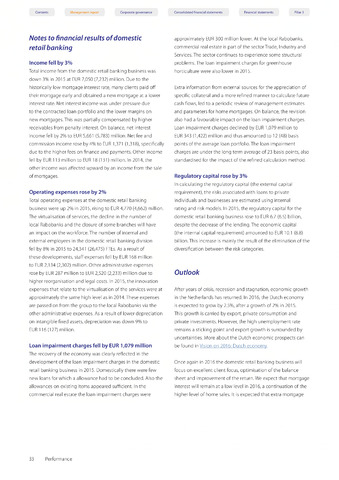Notes to financial results of domestic
retail banking
Outlook
Contents Management report Corporate governance Consolidated financial statements Financial statements Pillar 3
Income fell by 3%
Total income from the domestic retail banking business was
down 3% in 2015 at EUR 7,050 (7,232) million. Due to the
historically low mortgage interest rate, many clients paid off
their mortgage early and obtained a new mortgage at a lower
interest rate. Net interest income was under pressure due
to the contracted loan portfolio and the lower margins on
new mortgages. This was partially compensated by higher
receivables from penalty interest. On balance, net interest
income fell by 2% to EUR 5,661 (5,783) million. Net fee and
commission income rose by 4% to EUR 1,371 (1,318), specifically
due to the higher fees on finance and payments. Other income
fell by EUR 113 million to EUR 18 (131) million. In 2014, the
other income was affected upward by an income from the sale
of mortgages.
Operating expenses rose by 2%
Total operating expenses at the domestic retail banking
business were up 2% in 2015, rising to EUR 4,770 (4,662) million.
The virtualisation of services, the decline in the number of
local Rabobanks and the closure of some branches will have
an impact on the workforce. The number of internal and
external employees in the domestic retail banking division
fell by 8% in 2015 to 24,341 (26,475) FTEs. As a result of
these developments, staff expenses fell by EUR 168 million
to EUR 2,134 (2,302) million. Other administrative expenses
rose by EUR 287 million to EUR 2,520 (2,233) million due to
higher reorganisation and legal costs. In 2015, the innovation
expenses that relate to the virtualisation of the services were at
approximately the same high level as in 2014. These expenses
are passed on from the group to the local Rabobanks via the
other administrative expenses. As a result of lower depreciation
on intangible fixed assets, depreciation was down 9% to
EUR 116(127) million.
Loan impairment charges fell by EUR 1,079 million
The recovery of the economy was clearly reflected in the
development of the loan impairment charges in the domestic
retail banking business in 2015. Domestically there were few
new loans for which a allowance had to be concluded. Also the
allowances on existing items appeared sufficient. In the
commercial real estate the loan impairment charges were
approximately EUR 300 million lower. At the local Rabobanks,
commercial real estate is part of the sectorTrade, Industry and
Services. The sector continues to experience some structural
problems.The loan impairment charges for greenhouse
horticulture were also lower in 2015.
Extra information from external sources for the appreciation of
specific collateral and a more refined manner to calculate future
cash flows, led to a periodic review of management estimates
and parameters for home mortgages. On balance, the revision
also had a favourable impact on the loan impairment charges.
Loan impairment charges declined by EUR 1,079 million to
EUR 343 (1,422) million and thus amounted to 12 (48) basis
points of the average loan portfolio. The loan impairment
charges are under the long term average of 23 basis points, also
standardised forthe impact of the refined calculation method.
Regulatory capital rose by 3%
In calculating the regulatory capital (the external capital
requirement), the risks associated with loans to private
individuals and businesses are estimated using internal
rating and risk models. In 2015, the regulatory capital for the
domestic retail banking business rose to EUR 6.7 (6.5) billion,
despite the decrease of the lending. The economic capital
(the internal capital requirement) amounted to EUR 10.1 (8.8)
billion. This increase is mainly the result ofthe elimination ofthe
diversification between the risk categories.
After years of crisis, recession and stagnation, economic growth
in the Netherlands has returned. In 2016, the Dutch economy
is expected to grow by 2.5%, after a growth of 2% in 2015.
This growth is carried by export, private consumption and
private investments. However, the high unemployment rate
remains a sticking point and export growth is surrounded by
uncertainties. More about the Dutch economic prospects can
be found in Vision on 2016: Dutch economy.
Once again in 2016 the domestic retail banking business will
focus on excellent client focus, optimisation ofthe balance
sheet and improvement ofthe return. We expect that mortgage
interest will remain at a low level in 2016, a continuation ofthe
higher level of home sales. It is expected that extra mortgage
33 Performance

